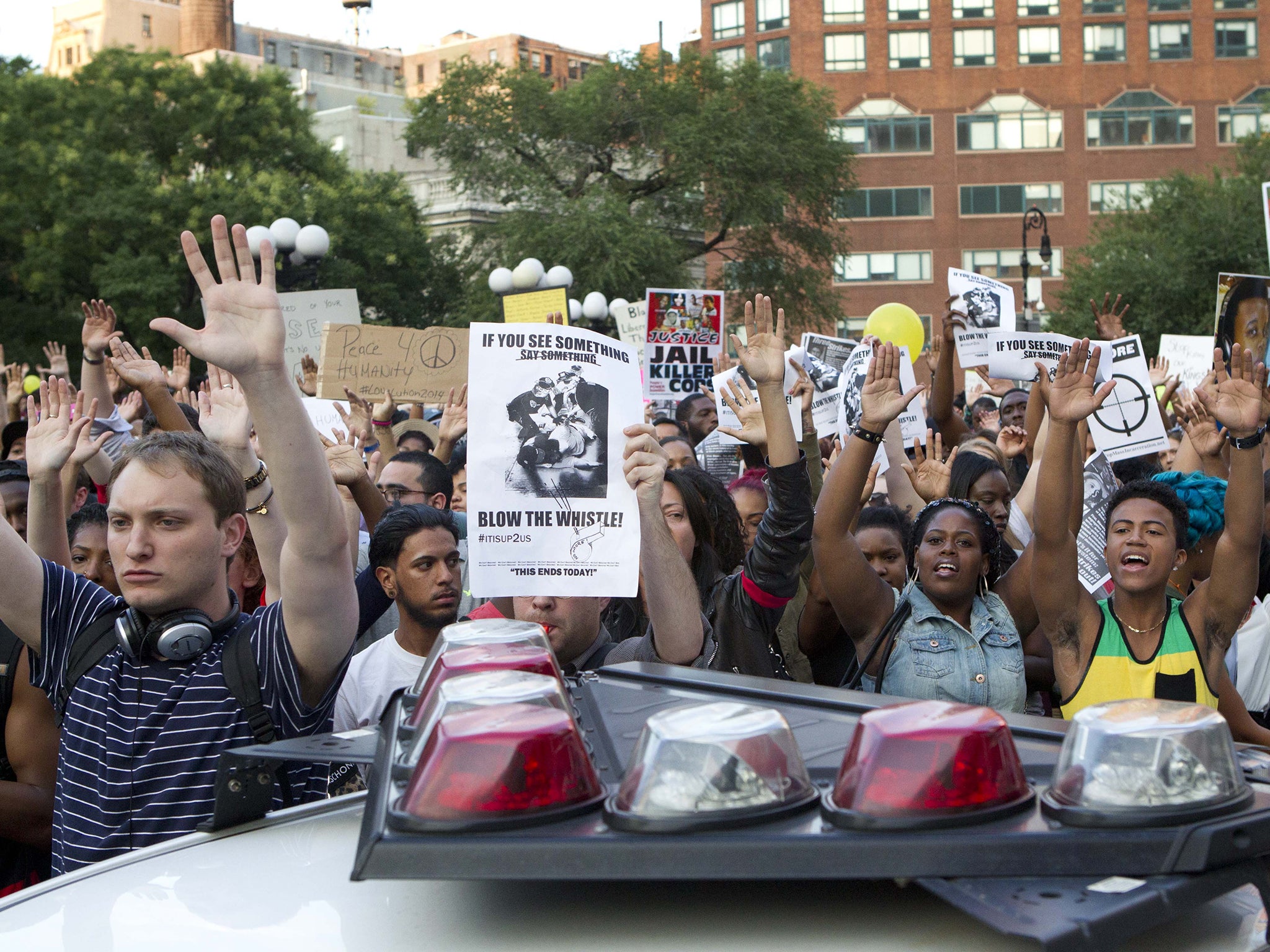Ferguson riots: Tensions ease as officer who shot Michael Brown named as Darren Wilson

Your support helps us to tell the story
From reproductive rights to climate change to Big Tech, The Independent is on the ground when the story is developing. Whether it's investigating the financials of Elon Musk's pro-Trump PAC or producing our latest documentary, 'The A Word', which shines a light on the American women fighting for reproductive rights, we know how important it is to parse out the facts from the messaging.
At such a critical moment in US history, we need reporters on the ground. Your donation allows us to keep sending journalists to speak to both sides of the story.
The Independent is trusted by Americans across the entire political spectrum. And unlike many other quality news outlets, we choose not to lock Americans out of our reporting and analysis with paywalls. We believe quality journalism should be available to everyone, paid for by those who can afford it.
Your support makes all the difference.After a shift to less confrontational police tactics had eased tensions overnight in Ferguson, Missouri, authorities in the deeply fractured town finally gave in to demands that it release the name of the police officer whose deadly confrontation with a young black teenager had set off successive nights of violent confrontation on its streets.
They also released new information about the circumstances of the shooting, apparently tying the teenager, 18-year-old Michael Brown, to an attempted robbery in a nearby convenience store minutes before he was killed.
In a brief press conference, Thomas Jackson, the Ferguson police chief, said the name of the police officer who shot the young Mr Brown just after midday last Saturday on a street outside a low income housing complex was Darren Wilson. He said he was a six-year veteran of the department with no history of disciplinary action for past infractions. He had earlier refused to release the name citing concern for the officer’s safety.
No arrests had been reported overnight in Ferguson, a mostly black suburb of St Louis, which over the previous four nights had been the scene of repeated stand-offs between armour-wearing police wielding tear gas canisters and stun grenades and protesters enraged at the shooting of Brown the previous Saturday.
But a decision by Governor Jay Nixon to take responsibility for security away from the Ferguson police department and give it to a state police force headed by an African-American captain went a great distance on Thursday night to defuse the atmosphere on the street. Whereas on previous nights, the streets were filled with tear gas, smoke and other projectiles, on Thursday night Highway Patrol Captain Ron Johnson was walking and chatting with protestors.
The convulsions in Ferguson have gripped the whole country and by Thursday both Governor Nixon and President Barack Obama were urgently calling for calm. There has also been growing revulsion at the intensity of the police response in the community before Thursday, prompting widespread calls for an examination of how police forces across the nation have become increasingly militarised, thanks in part to surplus equipment from the Pentagon.
Feeding the drama in Ferguson has been a lack of clarity about happened last Saturday. The police have said that Officer Wilson was assaulted by the young man and have spoken of his being treated in hospital for facial swelling. But witnesses have said that the teen had his hands in the air in surrender when he was brought down by gun fire.
As well as releasing the officer’s name, Chief Jackson also provided a packet of additional documents and video footage showing that Officer Wilson and colleagues had been called to a “strong-arm” robbery in a shop near to the location where Mr Brown was later shot. He did not confirm that one of those seen on security footage in the store was Mr Brown, but the documentation said he had been identified by one officer as being one of those in the store.
A "strong-arm" robbery implies that violence but no firearms were involved. The police assert that the officer was called to the incident at 11.52 am. The shooting of Mr Brown occurred only a few minutes later when he and one other man were asked to get out of the street by Officer Wilson who was in a police vehicle.
Chief Jackson wouldn’t response when pressed to explain what precise link there may be between the robbery and the shooting of Mr Brown. “I cannot discuss the investigation about the attempted apprehension of the suspect in the strong-arm robbery,” he said. “That goes to the county prosecutor’s office.”
New protests erupted almost immediately after the police briefing, with marchers demanding "justice".
Thursday evening also saw scores of additional protest marches, rallies and vigils in different locations across the country mourning the death of the 18-year-old but also demanding information on why it happened and how. Among places that saw hundreds of concerned people gather, black and white, were both downtown St Louis just a few miles from Ferguson and also Times Square, New York, which after dark was closed by protesters.
Several members of Congress, currently on summer recess, have been driving the calls for an investigation into the transformation of police departments in recent years into mini-militaries with all manner of weapons and assault hardware, ranging from drones, machine guns to tanks.
“Our Main Streets should be a place for business, families and relaxation, not tanks and M16s,” Democratic Congressman Hank Johnson said announcing plans to introduce legislation when Congress returns in September to curb the trend. “Militarizing America’s Main Streets won’t make us any safer, just more fearful and more reticent.”
Join our commenting forum
Join thought-provoking conversations, follow other Independent readers and see their replies
Comments